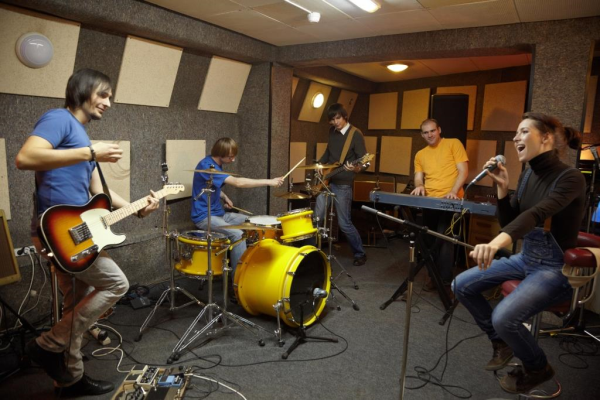Being based in Franklin, TN—a community on the outskirts of Nashville—definitely has its perks, including always having great live music at our fingertips. Nashville is a mecca of art and culture, particularly for people in the music industry. According to Google, there are over 350 music studios in Nashville (and that's not counting the home studios!) Unless a studio has been around for decades or has produced multiple successful artists, it might be difficult for them to stand out above the rest of the noise. So, how does a recording studio in Nashville break out from the pack and attract the best and the brightest talent? Marketing and branding.

View of the Nashville skyline from the riverfront.
As we've talked about before in various blog articles, branding is about more than just a cool logo; it's about your company's reputation. What do people say about your company behind your back—positive or negative? That is your brand. The best way to cultivate and control your brand (in addition to producing great work and having stellar customer service, of course) is to promote your brand through various marketing outlets. Here's a list of 7 things you can do to market and brand your own studio.
1. Get identifying signs: If we've said it once, we've said it a million times. Any business that wants to have even a modicum of success needs to have an exterior identifying sign! Studies have shown that 50% of your customers will discover your business because of your identifying sign, and over 1/3 of those interviewed said they would not enter a building or business that didn't have an identifying sign. Would you enter a business that didn't have a sign outside? I would be afraid I was at the wrong building. "Well, Google Maps says that the studio is here, but all I see is a sketchy building with no sign on it." = what people will say if you have no sign on your studio.
2. Have a website: This one seems to be turning into more and more of a requirement as the years go on. I'm always genuinely surprised when a company doesn't have any web presence at all. It recently happened that I had tried pizza from a place in Franklin and loved it, but when I tried to find their phone number online a couple of Fridays later to order myself a delicious pie, there was nothing to be found. Nothing! Not even a Google Places listing with a phone number! How was I supposed to order my delicious pizza if this restaurant wouldn't provide me with a phone number to call and find out if they deliver or what their hours are? Think of all the potential customers they are missing out on who might be searching for "pizza places in Franklin, TN." Don't let your studio become this pizza place (which, I've noticed is no longer in business). If you are just starting out and are worried about your budget, don't feel like you have to shell out tons of dough on a super cutting-edge website. You should, however, have at least something online to help potential clients find you. Heck, sometimes even a Facebook page is enough to get you started! Which leads to our third tool...
3. Use social media: Do a little research and think about where your potential client-base hangs out online. Use this information to decide which social platforms would be the best for you to focus on. LinkedIn is home to professionals—specifically executives—and people looking to network. This might be a great place to keep tabs on the music industry in your area and to network with other people in the biz. Studies show that the average Twitter user is young (18–29), educated, and socioeconomically middle class or higher, so it might be a great way to reach out to young hopefuls looking to get started or to attract media buzz from local interest groups. Instagram also hosts mostly young users interested in highly visual images of what they are interested in. Pinterest has one of the most rapidly growing user bases and is generally targeted to females, but more men are joining every day. Facebook is ubiquitous and is used by most age groups, although it is currently skewing older. Every single person who has a Google account for email, document sharing or more automatically has a Google+ account, and Google will rank people with a strong Google+ presence as more "legitimate" and therefore more worthy of front page search results. (Biased, yes, but can you blame them?) Of course, in the music industry you cannot forget YouTube—an excellent platform (and another Google tool) where you can post music videos and more to the world. The great thing is that all of these are free to join, and you can really cultivate your brand and engage with your fans and customers this way.
 Great take guys! Now let me post about this on Twitter...
Great take guys! Now let me post about this on Twitter...
4. Get testimonials: Obviously if you are just starting out, you're probably not going to have a lot of accolades or celebrity success stories yet. But, hey, a positive review is a positive review, no matter where it comes from. Put testimonials on your website and encourage your clients to leave a review on Google or Yelp. This is a great way to get referrals since most people take to the internet to research before making decisions on where to spend their money or who to work with. Most of the big recording studios in Nashville are not shy at all about name-dropping either. Many, like the renowned Blackbird Studios started by Martina McBride and John McBride, have a whole part of their website devoted to clients they've worked with. It's a veritable who's who of the big dogs of every style of music from classic rock artists, pop starts, country music royalty, popular indie bands, and even jazz singers. It's pretty impressive, and it's likely one of the reasons why they're one of the most well-known studios in Nashville. Again, if you're just starting out you probably don't have Bon Jovi recording with you, but the music industry is fickle and that young band you just worked with could be huge in a couple of years. So, always try and get good reviews from everyone you work with by making their experience a positive one—it (literally) pays to be nice!
5. Be consistent: Part of branding is creating a recognizable reputation. This means using the same name and logo on everything from business cards to signs to your website. Avoid abbreviating your studio's name or going by a nickname, if you can, to keep people from getting confused.This doesn't mean you can never "rebrand" yourself or change the way you do things, but it means that you should try to keep your name and company graphics as recognizable as possible. If you are changing your name, logo, or web domain, let people know about it in advance. Regularly post about the upcoming change on your social accounts or blog before you do it.
6. Be different: A great way to stand out from the crowd is to find a niche that makes you different from your competitors. Whatever it is that makes you different, not only should you be consistent about the name and images you use, but also about the way your business sets itself apart. Are you the friendliest studio in town? Do you have the most networking connections? Is your studio equipment state of the art? Maybe you work one on one with solo artists and never do bands, or maybe you connect the artists who record with you to live venues. Focus on whatever makes you unique and consistently do work that backs up the brand you are promoting.
7. Keep it real: You can consistently promote the same brand image all you want, but if it's not actually honest then it will definitely bite you in the rear. For example, if a company claims to have great customer service but then makes a habit of showing up late for appointments, forgetting to call clients back, or making people overpay for low-quality service, then the brand of "customer service" they want people to think they have is not the brand they actually have. Your brand is your reputation that you have the ability to mold and channel. Claiming to be something that you're not will backfire, so try hard to become the company you want people to think you are. As Confucius said, "He that would perfect his work must first sharpen his tools."
Obviously, there's a lot more to marketing and branding than just these tips, but they're a good place to start! Contact 12-Point SignWorks at 615-595-6564 to talk to a representative about branding and logo development today!



Leave a Reply